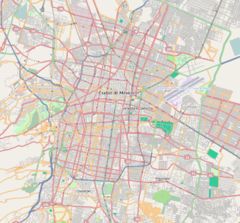Talismán metro station
| STC rapid transit | |||||||||||||||||||||||||||||||||||||||||||||||||||||||||||||||||||||||||||||||||||||
 | |||||||||||||||||||||||||||||||||||||||||||||||||||||||||||||||||||||||||||||||||||||
| General information | |||||||||||||||||||||||||||||||||||||||||||||||||||||||||||||||||||||||||||||||||||||
| Location | Av. Congreso de la Unión Gustavo A. Madero Mexico City Mexico | ||||||||||||||||||||||||||||||||||||||||||||||||||||||||||||||||||||||||||||||||||||
| Coordinates | 19°28′27″N 99°06′29″W / 19.47428°N 99.108009°W | ||||||||||||||||||||||||||||||||||||||||||||||||||||||||||||||||||||||||||||||||||||
| Operated by | Sistema de Transporte Colectivo (STC) | ||||||||||||||||||||||||||||||||||||||||||||||||||||||||||||||||||||||||||||||||||||
| Line(s) | |||||||||||||||||||||||||||||||||||||||||||||||||||||||||||||||||||||||||||||||||||||
| Platforms | 2 side platforms | ||||||||||||||||||||||||||||||||||||||||||||||||||||||||||||||||||||||||||||||||||||
| Tracks | 2 | ||||||||||||||||||||||||||||||||||||||||||||||||||||||||||||||||||||||||||||||||||||
| Construction | |||||||||||||||||||||||||||||||||||||||||||||||||||||||||||||||||||||||||||||||||||||
| Structure type | Elevated | ||||||||||||||||||||||||||||||||||||||||||||||||||||||||||||||||||||||||||||||||||||
| Platform levels | 1 | ||||||||||||||||||||||||||||||||||||||||||||||||||||||||||||||||||||||||||||||||||||
| Parking | No | ||||||||||||||||||||||||||||||||||||||||||||||||||||||||||||||||||||||||||||||||||||
| Bicycle facilities | No | ||||||||||||||||||||||||||||||||||||||||||||||||||||||||||||||||||||||||||||||||||||
| Other information | |||||||||||||||||||||||||||||||||||||||||||||||||||||||||||||||||||||||||||||||||||||
| Status | In service | ||||||||||||||||||||||||||||||||||||||||||||||||||||||||||||||||||||||||||||||||||||
| History | |||||||||||||||||||||||||||||||||||||||||||||||||||||||||||||||||||||||||||||||||||||
| Opened | 29 August 1981 | ||||||||||||||||||||||||||||||||||||||||||||||||||||||||||||||||||||||||||||||||||||
| Passengers | |||||||||||||||||||||||||||||||||||||||||||||||||||||||||||||||||||||||||||||||||||||
| 2023 | 1,167,027[1] | ||||||||||||||||||||||||||||||||||||||||||||||||||||||||||||||||||||||||||||||||||||
| Rank | 174/195[1] | ||||||||||||||||||||||||||||||||||||||||||||||||||||||||||||||||||||||||||||||||||||
| Services | |||||||||||||||||||||||||||||||||||||||||||||||||||||||||||||||||||||||||||||||||||||
| |||||||||||||||||||||||||||||||||||||||||||||||||||||||||||||||||||||||||||||||||||||
| |||||||||||||||||||||||||||||||||||||||||||||||||||||||||||||||||||||||||||||||||||||
| |||||||||||||||||||||||||||||||||||||||||||||||||||||||||||||||||||||||||||||||||||||
Talismán is a station along Line 4 of the Mexico City Metro, located in Gustavo A. Madero borough.[2][3]
General information
[edit]The station logo depicts a stylised image of a mammoth, with raised trunk and tusks.[2][3] During the construction of this station, the fossilised remains of a mammoth (Mammuthus meridionalis) were dug up by an excavation crew.[2] The fossil is now exhibited in a display in the station.[2] The station was opened on 29 August 1981.[4]
Talismán also means "amulet", and an elephant with a raised trunk is considered a good luck symbol.
This metro station, like others on Line 4, stands on Avenida Congreso de la Unión.[2]
The western exit is on the same block as Procter & Gamble Mexico's Talismán Plant, where soap products including Camay and Safeguard are produced. Trucks delivering tallow and olive oil (raw materials for soap) are a common sight around the station.
Talisman is served by several Pesero routes to Potrero, Tepito and Merced. It is also served by RTP Bus services on Avenida Congreso de la Unión.
From 23 April to 14 June 2020, the station was temporarily closed due to the COVID-19 pandemic in Mexico.[5][6]
Ridership
[edit]| Annual passenger ridership | |||||
|---|---|---|---|---|---|
| Year | Ridership | Average daily | Rank | % change | Ref. |
| 2023 | 1,167,027 | 3,197 | 174/195 | −0.67% | [1] |
| 2022 | 1,174,910 | 3,218 | 170/195 | +31.17% | [1] |
| 2021 | 895,738 | 2,454 | 181/195 | −6.67% | [7] |
| 2020 | 959,769 | 2,622 | 187/195 | −51.18% | [8] |
| 2019 | 1,965,881 | 5,385 | 186/195 | −2.69% | [9] |
| 2018 | 2,020,237 | 5,534 | 185/195 | −0.54% | [10] |
| 2017 | 2,031,195 | 5,564 | 182/195 | −3.18% | [11] |
| 2016 | 2,097,842 | 5,731 | 181/195 | −7.86% | [12] |
| 2015 | 2,276,807 | 6,237 | 171/195 | +1.28% | [13] |
| 2014 | 2,248,090 | 6,159 | 173/195 | −2.11% | [14] |
Exits
[edit]- East: Avenida Congreso de la Unión and Oriente 171 street, Colonia Ampliación Aragón
- West: Avenida Congreso de la Unión and Avenida Talismán, Colonia Granjas Modernas
References
[edit]- ^ a b c d "Afluencia de estación por línea 2023" [Station traffic per line 2023] (in Spanish). Sistema Transporte Colectivo Metro. 2024. Archived from the original on 27 January 2024. Retrieved 24 January 2024.
- ^ a b c d e "Talismán" (in Spanish). Archived from the original on 19 March 2012. Retrieved 14 August 2011.
- ^ a b Archambault, Richard. "Talismán » Mexico City Metro System". Retrieved 14 August 2011.
- ^ Monroy, Marco. Schwandl, Robert (ed.). "Opening Dates for Mexico City's Subway". Retrieved 14 August 2011.
- ^ "Cierre temporal de estaciones" (PDF) (in Spanish). Metro CDMX. Retrieved 25 April 2020.
- ^ Hernández, Eduardo (13 June 2020). "Coronavirus. Este es el plan para reabrir estaciones del Metro, Metrobús y Tren ligero". El Universal (in Spanish). Retrieved 15 June 2020.
- ^ "Afluencia de estación por línea 2021" [Station traffic per line 2021] (in Spanish). Sistema Transporte Colectivo Metro. 2020. Archived from the original on 7 March 2022. Retrieved 7 March 2022.
- ^ "Afluencia de estación por línea 2020" [Station traffic per line 2020] (in Spanish). Sistema Transporte Colectivo Metro. 2021. Archived from the original on 21 June 2021. Retrieved 21 June 2021.
- ^ "Afluencia de estación por línea 2019" [Station traffic per line 2019] (in Spanish). Sistema Transporte Colectivo Metro. 2020. Archived from the original on 8 April 2020. Retrieved 3 May 2020.
- ^ "Afluencia de estación por línea 2018" [Station traffic per line 2018] (in Spanish). Sistema Transporte Colectivo Metro. 2019. Archived from the original on 6 June 2019. Retrieved 7 April 2020.
- ^ "Afluencia de estación por línea 2017" [Station traffic per line 2017] (in Spanish). Sistema Transporte Colectivo Metro. 2019. Archived from the original on 3 May 2020. Retrieved 3 May 2020.
- ^ "Afluencia de estación por línea 2016" [Station traffic per line 2016] (in Spanish). Sistema Transporte Colectivo Metro. 2017. Archived from the original on 3 May 2020. Retrieved 3 May 2020.
- ^ "Afluencia de estación por línea 2015" [Station traffic per line 2015] (in Spanish). Sistema Transporte Colectivo Metro. 2016. Archived from the original on 3 May 2020. Retrieved 6 May 2020.
- ^ "Afluencia de estación por línea 2014" [Station traffic per line 2014] (in Spanish). Sistema Transporte Colectivo Metro. 2015. Archived from the original on 3 May 2020. Retrieved 6 May 2020.
External links
[edit] Media related to Talismán (station) at Wikimedia Commons
Media related to Talismán (station) at Wikimedia Commons


